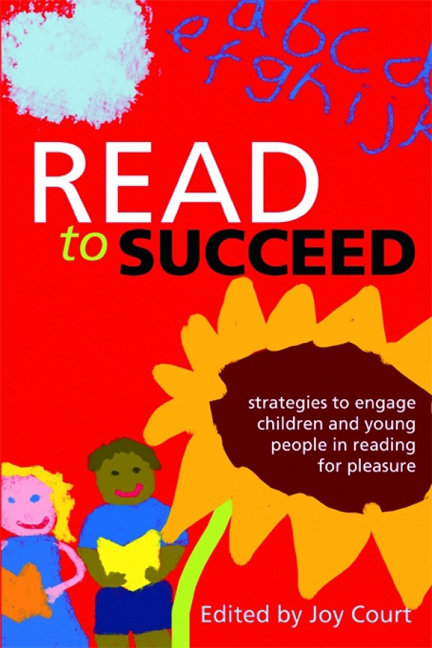Book contents
- Frontmatter
- Dedication
- Contents
- Foreword
- Contributors
- Introduction
- 1 It's never too soon to start
- 2 How children begin to read
- 3 Creating young readers: teachers and librarians at work
- 4 The six dimensions of the ‘honeycomb’ model, and its implications for literacy, libraries and literature in New Zealand
- 5 The Summer Reading Challenge in libraries: a continuing success
- 6 Stockport does Book Idol! A case study linking libraries and schools to inspire reading for pleasure
- 7 There and back again: restoring reading to the classroom
- 8 Promoting excellence: shadowing the CILIP Carnegie and Kate Greenaway Medals
- 9 Choice and motivation: local book awards
- 10 The sport of reading
- 11 Adventures in the book trade: libraries and partnerships
- 12 The hard-to-reach reader in the 21st century
- 13 Creative reading and insideadog.com.au
- Index
- Miscellaneous Endmatter
- Miscellaneous Endmatter
- misc-endmatter
11 - Adventures in the book trade: libraries and partnerships
Published online by Cambridge University Press: 08 June 2018
- Frontmatter
- Dedication
- Contents
- Foreword
- Contributors
- Introduction
- 1 It's never too soon to start
- 2 How children begin to read
- 3 Creating young readers: teachers and librarians at work
- 4 The six dimensions of the ‘honeycomb’ model, and its implications for literacy, libraries and literature in New Zealand
- 5 The Summer Reading Challenge in libraries: a continuing success
- 6 Stockport does Book Idol! A case study linking libraries and schools to inspire reading for pleasure
- 7 There and back again: restoring reading to the classroom
- 8 Promoting excellence: shadowing the CILIP Carnegie and Kate Greenaway Medals
- 9 Choice and motivation: local book awards
- 10 The sport of reading
- 11 Adventures in the book trade: libraries and partnerships
- 12 The hard-to-reach reader in the 21st century
- 13 Creative reading and insideadog.com.au
- Index
- Miscellaneous Endmatter
- Miscellaneous Endmatter
- misc-endmatter
Summary
Introduction
Libraries have always been about connections: connecting readers to the past, to other cultures and to the vast range of ideas and thinking that document the human race. In the present day, the cultural context within which libraries sit has changed, and there are expectations that libraries should now act as community hubs or offer access to a range of local council services. Whether social, creative or knowledge-based, connections still remain at the heart of the efficient library service. This chapter aims to emphasize and advocate the importance of connections with the book trade as a key component of successful, imaginative and innovative reading development work.
Issues and opportunities
What do we mean when we talk about the book trade? It can refer to agents, who act as intermediaries for authors, negotiating the best deals and selling the rights to manuscripts and ideas – the raw products of the book industry. It can, of course, refer to the publishers, who collaborate with authors to hone those ideas and manuscripts and who package, design and market them to create books that inform, educate and entertain. It can refer to wholesalers, who establish the lines of supply for those books, ensuring that the titles people want and need are available to them. Lastly, it can refer to retailers, who sell the books to the public, organizing displays and promotions to aid that transaction.
Aspects of the work that libraries are engaged in contribute directly to the book trade, particularly in terms of supply and procurement. Other aspects don't always have that same synergy, and there can be tension between the commercial drive and the ethos of reading development, the desire to engender situations where new readers feel that spark of excitement when a book truly resonates with them and, on the occasions when that happens sequentially, developing a new, dedicated and ardent reader. A prime example of this tension occurred in 2008 when the Children's Book Group of the Publishers Association tried to ensure that all books were age banded. This was based on quantitative and qualitative research commissioned by the Publishers Association and carried out by Acacia Avenue which suggested that gift purchasing of books might be significantly increased if more guidance was featured on the books themselves. Information about this can be found on the Publishers Association website (www.publishers.org.uk).
- Type
- Chapter
- Information
- Read to SucceedStrategies to Engage Children and Young People in Reading for Pleasure, pp. 187 - 200Publisher: FacetPrint publication year: 2011



